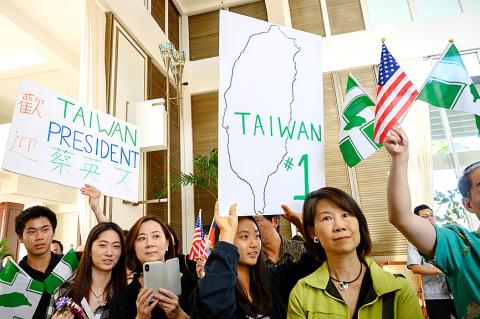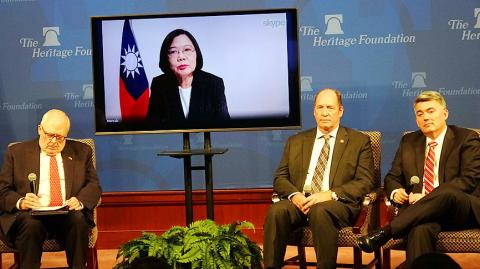President Tsai Ing-wen (蔡英文) criticized China for seeking to change the “status quo” across the Taiwan Strait, but said that the US was responding positively to Taipei’s requests for new arms sales in the face of growing pressure from China, as she spoke via video link on Wednesday during a transit stop in Hawaii to a Heritage Foundation seminar in Washington.
Despite Taiwan’s efforts to pursue peaceful coexistence, China has “used every opportunity to alter the ‘status quo’” and undermine Taiwan’s democratic institutions, heighten military tensions and limit the nation’s international space, Tsai said.
Beijing’s schemes have led to growing distrust among Taiwanese, posing an underlying challenge to the future of cross-strait relations, she said.

Photo: AP, courtesy of the Presidential Office
“China’s actions have underscored the need for Taiwan to increase our self-defense and deterrence capabilities. To be clear, we seek peace, not hostility,” she said. “We will continue to seek closer partnerships with like-minded countries so that we can fulfill the promise of the Indo-Pacific strategy,” which seeks to make nations sovereign, without being subject to coercion.
“It is rooted in our shared desire to sustain the rules-based framework that has been at the heart of this region’s prosperity since the Second World War. We believe that any effort to change that framework would be a fundamental mistake,” she added. “Taiwan is a force for good in the region. We are a democracy and the only democratic Chinese-speaking country in the world.”
Taiwan takes pride in its freedom and human rights, which are the basis of the nation’s values, and is deeply committed to fostering a more peaceful, stable and prosperous regional environment, she said.

Photo: CNA
“My administration has pledged to be much more forceful in defending Taiwan’s hard-won freedoms and ensuring that our country continues to be a beacon of democracy in the Indo-Pacific,” she said.
The government has submitted new requests to the US for M1 Abrams tanks and F-16V jets, which “would greatly enhance our land and air capabilities, strengthen military morale and show to the world the US commitment to Taiwan’s defense,” she said.
She said the process of US arms sales to Taiwan had become less politicized, adding: “We are able to have frank discussions with the US on the right equipment for Taiwan’s defense and the US is responding positively to our request.”
Mounting pressure from China for Taiwan to accept its “one country, two systems” model and Beijing’s attempts to alter the cross-strait “status quo” underscored the need for Taiwan to “increase our self-defense and deterrence capabilities,” the president said.
“Fortunately ... Taiwan does not stand alone,” she said. “The US’ commitment to Taiwan is stronger than ever.”
She said Taiwanese were also learning from Hong Kong’s experience under Beijing’s rule.
“‘One country, two systems’ will become just one country. The two systems do not seem to be respected that much,” she said.
Taiwan is taking a much more aggressive approach to counteract the Chinese government’s infiltration of its society and economy, as well as its interference in its domestic affairs, she said.
“We are also stepping up our engagements in the Pacific islands, where China has engaged in a campaign to increase its influence in the region. We have noted growing awareness of China’s efforts by the US, Australia, New Zealand and other responsible stakeholders,” she said.
Tsai thanked the US for its support in helping Taiwan maintain its diplomatic alliances, adding: “We remain committed to working with like-minded countries to protect the core values of good governance, accountability and sustainable development in the Pacific.”
Additional reporting by Reuters

MAKING WAVES: China’s maritime militia could become a nontraditional threat in war, clogging up shipping lanes to prevent US or Japanese intervention, a report said About 1,900 Chinese ships flying flags of convenience and fishing vessels that participated in China’s military exercises around Taiwan last month and in January last year have been listed for monitoring, Coast Guard Administration (CGA) Deputy Director-General Hsieh Ching-chin (謝慶欽) said yesterday. Following amendments to the Commercial Port Act (商港法) and the Law of Ships (船舶法) last month, the CGA can designate possible berthing areas or deny ports of call for vessels suspected of loitering around areas where undersea cables can be accessed, Oceans Affairs Council Minister Kuan Bi-ling (管碧玲) said. The list of suspected ships, originally 300, had risen to about

DAREDEVIL: Honnold said it had always been a dream of his to climb Taipei 101, while a Netflix producer said the skyscraper was ‘a real icon of this country’ US climber Alex Honnold yesterday took on Taiwan’s tallest building, becoming the first person to scale Taipei 101 without a rope, harness or safety net. Hundreds of spectators gathered at the base of the 101-story skyscraper to watch Honnold, 40, embark on his daredevil feat, which was also broadcast live on Netflix. Dressed in a red T-shirt and yellow custom-made climbing shoes, Honnold swiftly moved up the southeast face of the glass and steel building. At one point, he stepped onto a platform midway up to wave down at fans and onlookers who were taking photos. People watching from inside

Japan’s strategic alliance with the US would collapse if Tokyo were to turn away from a conflict in Taiwan, Japanese Prime Minister Sanae Takaichi said yesterday, but distanced herself from previous comments that suggested a possible military response in such an event. Takaichi expressed her latest views on a nationally broadcast TV program late on Monday, where an opposition party leader criticized her for igniting tensions with China with the earlier remarks. Ties between Japan and China have sunk to the worst level in years after Takaichi said in November that a hypothetical Chinese attack on Taiwan could bring about a Japanese

The WHO ignored early COVID-19 warnings from Taiwan, US Deputy Secretary of Health and Human Services Jim O’Neill said on Friday, as part of justification for Washington withdrawing from the global health body. US Secretary of State Marco Rubio on Thursday said that the US was pulling out of the UN agency, as it failed to fulfill its responsibilities during the COVID-19 pandemic. The WHO “ignored early COVID warnings from Taiwan in 2019 by pretending Taiwan did not exist, O’Neill wrote on X on Friday, Taiwan time. “It ignored rigorous science and promoted lockdowns.” The US will “continue international coordination on infectious